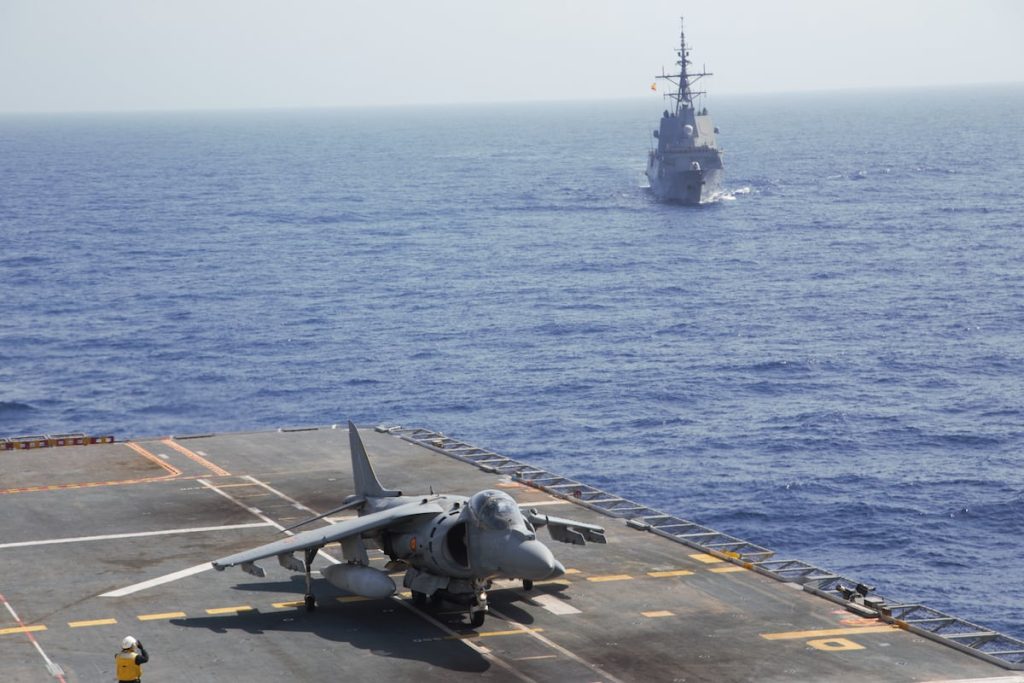The word of the day on Monday aboard the Juan Carlos I, the flagship of the Spanish Navy, was deterrence. Deployed in the waters of Souda, north of the Greek island of Crete, the majestic aircraft carrier, escorted by the frigate Blas de Lezo, has been cruising the Mediterranean for a month to support NATO surveillance, in a context marked by the war in Ukraine and the Russian threat. The Dédalo-24 expeditionary combat group has joined the NEST-24 (Neptune Strike) exercise, showcasing Spain’s commitment to deterrence and defense of NATO, the European Union, and the Mediterranean, Atlantic, and Baltic seas.
Since Russian troops invaded Ukraine in February 2022, NATO partners have been flexing their military muscles on land, sea, and air, especially on the Eastern flank of Europe, as part of a common defense and deterrence strategy in the face of Russia’s impending summer offensive. Spain and other NATO partners such as Italy, France, Turkey, Albania, and North Macedonia are sending signals of warning with their presence and amphibious exercises in the maritime area of the Alliance to avoid a confrontation with Russia, according to Rear Admiral Gonzalo Villar.
As NATO Secretary-General Jens Stoltenberg painted a somewhat optimistic future for Ukraine, the Spanish Navy demonstrated its military capabilities in the Mediterranean. Five Harrier aircraft took off from the short deck of the ship in a display of Spain’s military power, destined to support NATO allies and potentially aid Ukraine in the future. Stoltenberg stated that Ukraine will become a NATO member when the time is right, but until then, Western support for Kyiv remains focused on military and economic assistance without direct involvement in combat against Moscow.
After an impressive aerial display, the amphibious phase of the NEST-24 exercise began with an assault landing on enemy territory. The Juan Carlos I aircraft carrier deployed its LCM boats to transport infantry and equipment to the shore for the beach assault. The versatility of the carrier, as highlighted by Commander Ricardo Gómez Delgado, allows for a wide range of military operations, including transport of vehicles and troops, missile defense, and even explosive detection by a specially trained dog named Lika.
Apart from its presence in the Mediterranean, Spain also maintains naval operations near Albania, with the Galicia and Reina Sofía ships participating in similar exercises. Following the conclusion of NEST-24 exercises in May, the Juan Carlos I will continue its journey towards the Atlantic and Baltic seas as part of the common defense commitment. In June, the carrier will host Swedish pilots and officers during the BALTOPS-24 military exercise, marking the final expansion of NATO with the recent entry of Sweden and Finland into the Alliance, driven by their proximity to Russia and the security threats posed.
Overall, Spain’s active participation in NATO operations in the Mediterranean, Adriatic, and Baltic seas demonstrates its commitment to collective defense and deterrence against potential threats, particularly in the current geopolitical context dominated by the conflict in Ukraine and Russia’s aggressive posture. The presence of the Juan Carlos I aircraft carrier and its expeditionary combat group serves as a visible manifestation of Spain’s support for NATO and European security objectives in the region, while also contributing to broader alliance efforts to maintain stability and peace in the face of evolving security challenges.


